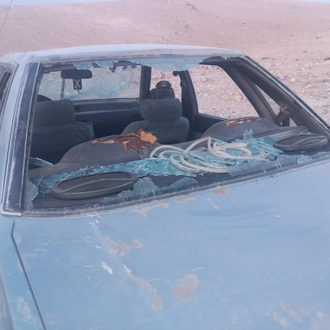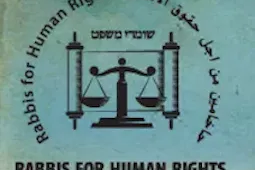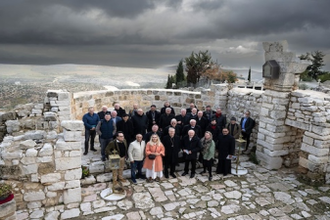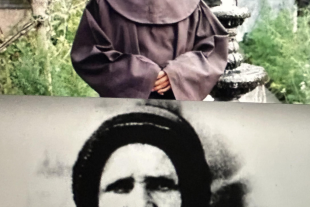Letter from the Holy Land - 5

Car vandalised by settlers
Melanie Nazareth has recently returned from Israel and occupied Palestine where she spent two and a half months with the Ecumenical Accompaniment Programme in Palestine and Israel.
This is my last letter. I started it when I was in the West Bank before the first Israeli bombing raid on Iran. Since then I have returned to the UK and the West Bank has been under military lockdown.
I will begin with an update on Ahmed's story from my first letter. We visited Ahmed and his wife again in May, when he told us that settlers had put a structure about 150m from where his house was, and had broken his nearby trees and vegetable plants. Others from his community were now living on land near the big landfill site. He had hoped for a better outcome but he could not return to his land because of the risk from settlers who followed him and the other shepherds to stop them from going back. He told us that settlers now wanted the land at the edge of the village, between the desert and the village, and so they were coming nearer and nearer. The people felt particularly vulnerable because they identified many of those involved as very bad settlers from further north. "Very dangerous", Ahmed said. He reiterated that what they were observing was settlers and soldiers and police collaborating to enable the settlers. But, he continued, we have to stay here, safe or not. "Ours" he said "is a Bedouin community and we work with the sheep, we don't have skills for anything else. The sheep are our lives. My grandfather, my father, me, we were born into this." "My sons,"he said, indicating his teenage sons, "this is their life too".
The last time I saw Ahmed was in early June. He had started building a small house and an animal shelter on his father's land. He said he was still having to buy food for his sheep, further impoverishing him, and was considering whether he needed to start selling off his sheep. He told us that there was now a settler tent and caravan near to where his house had been and that the remains of his house had been razed completely. The situation on the edge of the village was deteriorating. Settlers wearing military clothes were now bringing their sheep close to homes to graze on private land belonging to people in the village. The day before they had taken them to graze amongst the nearby olive trees which is a valuable source of grazing for villagers. The only slightly good news was that the people living by the landfill had managed to move. But they were now scattered.
In another nearby village a very similar story to Ahmed's is starting to play out.
*Akram lives with his wife and children in that village, but he too comes from a desert Bedouin community where most of his extended family still live. The village and their associated Bedouin desert communities have been subject to regular settler harassment for a long time - armed settlers chasing shepherds and sheep, throwing rocks at homes and animals, breaking trees, cutting down fences, entering homes when the women are alone and deliberately scaring children on their way to school - but in late May this year there was a sharp escalation. Akram and his family describe how one evening, seven settlers, accompanied by three dogs, brought their sheep into the community. The community knew better than to approach them, but their own dogs did not, and so very quickly, almost immediately, a further large group of around 30 armed settlers followed by soldiers arrived in the community. They attacked the villagers' sheep with metal bars, seven young sheep died as a result of their injuries. They threw stones, breaking the windows, and the solar panels on roofs. They entered one of the houses and threw the yoghurt and milk they found over the floor. They damaged the cars [cars are vital in these communities with no other access medical and other services].
There were no serious injuries but people were hit with sticks and an older woman was struck by a rock on her side. Tear gas was fired into homes where children were sheltering. Settler dogs chased the people. We were told that the soldiers did not stop the settlers and prevented the community from going to stop the settlers themselves. We have heard in other communities that the soldiers say they are there to protect the settlers and not Palestinians. We watched videos of the incident. We were shown the broken windows and solar panels and the rocks on them, we saw the remains of the yoghurt, tear gas casings and broken glass on the floor, and we saw the smashed up cars. We saw the dead goats lying in the sun.
One man said to us, looking at the damage, "This is a Bedouin community. We can't be alive without sheep. In the shepherding areas we had, we used to have grazing for the sheep, but now we have to buy food. We now have one person awake all night. The women and children can't sleep waiting for the settlers to attack again."
This community is one of the last Bedouin shepherding communities of the village, although there are other vulnerable communities further out into the desert. Akram told us that two years before, the village had shepherding communities all around, but now no one can safely go to these areas.
Addressing this situation is urgent, settler violence is increasing day by day and communities are under attack and being displaced very fast. We have seen that on one day a settler tent outpost will appear on land even though that land has a long history of usage by the local Palestinians, and often has legal paperwork evidencing ownership. People are too fearful to approach, sometimes there are explicit threats of violence. Within a week more structures appear, and within a few months there are caravans with families and construction is beginning. No one stops them.
In it's Advisory Opinion given in July 2024 The International Court of Justice ruled that under international law Israel has an obligation to cease all new settlement activity immediately and evacuate all settlers from the occupied territory.
See: www.un.org/unispal/wp-content/uploads/2024/07/186-20240719-adv-01-00-en.pdf
If you are interested in reading more on why forced displacement is unlawful, the UN has a fact sheet: www.unhcr.org/sites/default/files/legacy-pdf/4794b2d52.pdf
Loss of livelihood is also a big risk for people in these communities. The right to a livelihood is covered by Article 6 of the International Covenant on Economic, Social and Cultural Rights.
See: www.ohchr.org/en/instruments-mechanisms/instruments/international-covenant-economic-social-and-cultural-rights
There are more stories on the EAPPI Eyewitness website: www.eyewitnessblogs.com - including another powerful account of the impact of settler violence and one on the difficulties that children face in accessing education. You can also subscribe for email updates.
If you have been moved by these stories, please consider contacting your MP to ask what the UK Government can do about these issues. The website: www.writetothem.com makes it simple to send an email to your MP.


















